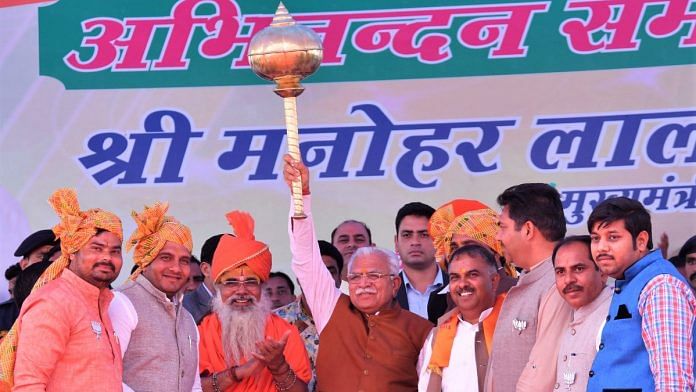Chandigarh: Thousands of Dalits are expected to undertake free pilgrimages to sites associated with three historical icons — Sant Kabir Das, Sant Ravidas, and Maharshi Valmiki — under a new scheme launched by Haryana’s BJP government last week, months before the assembly elections.
Kabir, the poet-saint famous for the wisdom of his dohas, boasts of a cross-community appeal on account of his message of inclusivity. The year 2019 is being observed in Haryana and other states as his 621st birth anniversary.
Ravidas, a poet-saint and exponent of the Bhakti movement that shunned the caste system, and Valmiki, the author of Ramayana‘s most popular version, were Dalits.
On Sunday, Haryana Chief Minister Manohar Lal Khattar gave his go-ahead to the state transport department to organise free tours for Dalits to the shrines built at the birthplaces of Kabir and Ravidas in Varanasi, and to Amritsar, where Valmiki is believed to have written the Ramayana. The first tour will begin from 1 July.
“It is important for every community to rediscover its roots and assert their identity,” said senior BJP leader Rajiv Jain, who also serves as media advisor to the Haryana chief minister.
“The programme started for Dalits is akin to the earlier visits the Haryana government organised for Sikhs to go to Nanded Sahib (one of Sikhism’s five takhts, located in Maharashtra.”
The timing of the move is significant: The BJP won all the state’s 10 parliamentary seats in the recent Lok Sabha election, mopping up almost 59 per cent of the vote share, but Khattar is not resting on his oars.
Badal started the trend
Khattar’s scheme for Dalits seems inspired by an initiative launched by the BJP’s Punjab ally Shiromani Akali Dal (SAD) four years ago.
In December 2015, Punjab’s then Parkash Singh Badal-led government had started the Mukh Mantri Teerth Darshan Yatra scheme, which offered free transportation, food and other facilities to pilgrims seeking to visit Nanded Sahib, the shrine of Sant Ravidas in Varanasi, and Ajmer Sharif in Rajasthan.
Around 1,000 Sikhs headed for Nanded took the first train under the scheme, which was flagged off on 1 January 2016.
All expenses of the six-day trip, including boarding and lodging, were borne by the state government.
Also read: Haryana’s please-all budget in election year includes sops for farmers & govt employees
Electoral gain was the aim
Badal had launched the scheme as the SAD faced severe criticism from Sikhs for not taking action against those responsible for the desecration of the Guru Granth Sahib (the holy book of the Sikhs, considered to be a live Guru) in the state in mid-2015.
Two Sikhs were killed in police firing during protests against the sacrilege incidents, bringing the Badal administration further under fire.
The free pilgrimage was seen as a move to assuage the religious voter, considered the core votebank of the SAD.
The SAD was, however, voted out in 2017.
Led by the Congress, the new administration in cash-strapped Punjab scrapped the scheme that June, despite its popularity, to redirect the funds to education.
Speaking to ThePrint, SAD leader Manjinder Singh Sirsa said the programme “was extremely popular and should not have been done away with”.
“The aim was to take people to religious places free of cost if they could not afford it. Religion teaches humanity only good things and a political change should not hamper the process of people connecting to their own religion,” he added.
When Delhi ‘copied’ Punjab
In Delhi, the Arvind Kejriwal government initiated a similar endeavour in 2018 with a free pilgrimage scheme for senior citizens looking to undertake any of the following journeys: Delhi-Mathura-Vrindavan-Agra-Fatehpur Sikri-Delhi, Delhi-Haridwar-Rishikesh-Neelkanth-Delhi, Delhi-Ajmer-Pushkar-Delhi, Delhi-Amritsar-Wagah border-Anandpur Sahib-Delhi, and Delhi-Vaishno Devi-Jammu-Delhi.
The scheme became operational in December last year. Although income is no criterion, preference is given to economically-weaker sections on a first-come-first-served basis.
How Haryana scheme will work
In Haryana, registration for the pilgrimage will be undertaken by the deputy commissioner’s office. Once registered, the pilgrims will be provided second-class reserved train tickets for free.
Initially, 100 devotees from each of Haryana’s 90 assembly constituencies will be chosen every year. It will be on a first-come-first served basis, and each family will only be able to avail of the scheme once.
Dalits account for 25 per cent of the state’s population, and the scheme is expected to bolster the BJP’s efforts to woo the state’s non-Jat voters.
The BJP’s experiment of consolidating non-Jat voters, starting from the 2014 parliamentary election, has borne fruit, with Khattar, a Punjab khatri from Karnal, being credited with having ended the four-decade dominance of Jats in Haryana politics.
Some Dalits, meanwhile, are still apprehensive about the rollout.
“We welcome the scheme,” said Ramkrishan of Panchkula, “but we have been told that it would be limited to only a few hundred people from each constituency. Many people I know who want to go on this tour will not be able to benefit.”
Also read: This is how Khattar helped BJP sweep Haryana’s 10 seats



